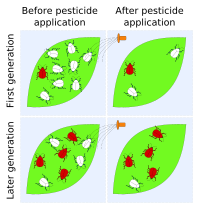
Photo from wikipedia
Transgenic crops producing insecticidal proteins from Bacillus thuringiensis (Bt) have revolutionized pest control, but the benefits of this approach have been reduced by the evolution of resistance in pests. The… Click to show full abstract
Transgenic crops producing insecticidal proteins from Bacillus thuringiensis (Bt) have revolutionized pest control, but the benefits of this approach have been reduced by the evolution of resistance in pests. The widely adopted ’pyramid strategy’ for delaying resistance entails transgenic crops producing two or more distinct toxins that kill the same pest. The limited experimental evidence supporting this strategy comes primarily from a model system under ideal conditions. Here we tested the pyramid strategy under nearly worst-case conditions, including some cross-resistance between the toxins in the pyramid. In a laboratory selection experiment with an artificial diet, we used Bt toxins Cry1Ab, Cry1F, and Cry1Ie singly or in pairs against Ostrinia furnacalis, one of the most destructive pests of corn in Asia. Under the conditions evaluated, pairs of toxins did not consistently delay the evolution of resistance relative to single toxins.
Journal Title: Toxins
Year Published: 2019
Link to full text (if available)
Share on Social Media: Sign Up to like & get
recommendations!